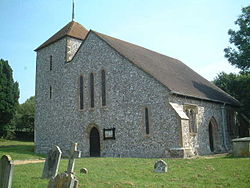Clapham, Sussex
| Clapham | |
| Sussex | |
|---|---|
 St Mary The Virgin, Clapham | |
| Location | |
| Grid reference: | TQ094063 |
| Location: | 50°50’47"N, 0°26’51"W |
| Data | |
| Population: | 275 (2011) |
| Post town: | Worthing |
| Postcode: | BN13 |
| Dialling code: | 01903 |
| Local Government | |
| Council: | Arun |
| Parliamentary constituency: |
Arundel and South Downs |
Clapham is an inland, rural village in Sussex, sitting on varying downslopes and escarpment of the South Downs three miles north of Angmering on the A280 road and north of the A27 crossroads. It is adjacent to the village of Patching.

The main part of the village is known simply as The Street, a single long dead-end road coming off the A280 and containing the majority of the village's housing. The Street is also home to the local school and, up a slight incline into the woods, the Church of St Mary the Virgin, a 12th-century building. The houses of The Street are a combination of 1930s council houses, much older original village cottages and post-Second World War bungalows in some of the new closes.
The village industry in former days was the brickworks of the Clapham Common Brick & Tile Company which was based there from the early 20th century up until the 1970s, although the quantities of clay available meant that there had been brickmaking activity on the site since the 18th century. The site of the old brickworks is now occupied by a branch of Travis Perkins.

The houses of the village are surrounded mostly by fields and woodland, but the increasing encroachment of housing and road-building into the area is decreasing this green belt. Arun District Council's local plan envisages that in the long term at least in the early 21st century Clapham and Patching will be slowly absorbed as conjoining suburbs of Durrington as more houses and retirement apartments become demanded.
History
Clapham is mentioned in the Domesday Book of 1086, where it is spelled Clopeham.
For many years much of the land around Clapham was owned by the Dukes of Norfolk and subsequently, after a land exchange, by the Somerset family, although by the early 20th century most of the land owned by the family had been sold off or donated to the village.
Around the village
There is a village tea room and stores based in a portable cabin concreted into a corner of the recreation ground on The Street. There are also a retirement home, a kennels and a business centre. Many of the residents of working age have jobs in nearby Worthing.
There is one major farm in Clapham, which for many decades was operated by the tenant farmers, the Cornford family, and now run as part of the Somerset Estate.
Within the parish lies Clapham Wood. The area was under the media spotlight in the 1970s due to many strange or gruesome events which took place in local woodlands which became known collectively as the 'Clapham Wood Mystery'. The woods have often been the subject of conspiracy theories and clais of UFOs and satanic rituals, none borne out by cold evidence.
The village primary school was established in the early 19th century, and has occupied its current building since the 1830s, with various improvements over recent years - the school finally gained indoor toilets in 1990.
Society
The Village Hall, opened in 1977, is also shared with the neighbouring Patching. Previously, a smaller village hall was located on The Street in Clapham, but this was destroyed by fire. The Hall is home to many local clubs and societies, and is regularly used as a venue for Church and School fetes.
- Bowls: Short Mat Bowls club
- Cricket: Clapham & Patching Cricket Club used to play on the village green but the club was forced to merge with the local Littlehampton club in 2000 and now plays home matches there.
The nearest local pubs, The World's End (formerly the Horse and Groom) and, although slightly further away for most residents, The Fox, are both located in Patching.
Outside links
| ("Wikimedia Commons" has material about Clapham, Sussex) |
